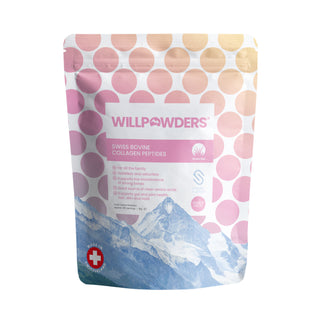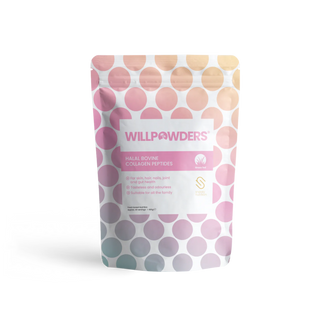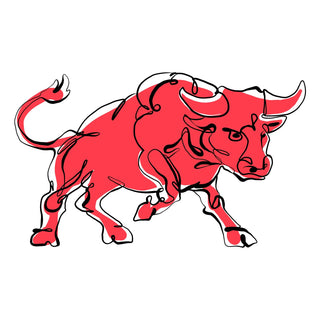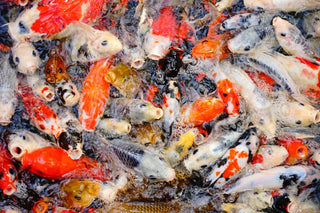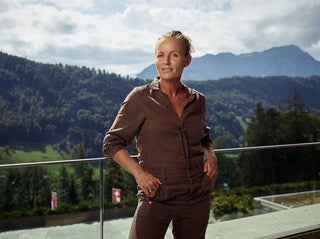
Cuddling Cows in the Cleanest of Air
Famed for her irreverent and gung-ho take on Big Food and Big Pharma, you’d be forgiven for thinking that straight-talking WillPowders founder, Davinia Taylor, isn’t a big softie at heart. She might have an ability to cut through bullshit in one laser-aimed sentence and a dramatic eye roll, demonstrating her outspoken views on the ‘healthy’ foods we’re told to put in our bodies by erroneous Big Food messaging, but, most recently, when it comes to furry friends, Swiss customs might do well to check she wasn’t tempted to engage in a little light cattle rustling (for research purposes only, of course!).
Davinia’s Determination to Help Us Re-Learn Wellness Does Not Mean She’s Willing to Sacrifice Animal Welfare.
No siree! When it comes to how her bovine collagen products are raised in pasture to the moment they end up in your kitchen, she’s a staunch advocate for good animal welfare. And, let’s face it, if she’s going to take on the big guns of Big Food and Pharma (and she does - brilliantly), she’d better know her stuff (and, of course, not being one to skip the spadework, she knows her collagen).
In order to stand up and be counted, Davinia wanted to meet the cows and one of the farming families from whom she sources our bovine collagen peptides and to ensure that what she has been told about high welfare cattle is true. She is more than happy to lay down the gauntlet across the collagen industry when she asks from a Swiss Alpine mountainside, ‘Do other collagen companies do this?’
Knowing how fiercely she nails her colours to the mast, are we surprised that, when it comes to the lives of the Swiss cattle whose hides go on to become her WillPowders Bovine Peptides, she’s going to get up close and personal, cheek by jowl and nose to nose with them there cows in order to say, with absolute collagen confidence when it graces your morning beverage, that they live the happiest, purest and longest lives of any farmed cattle in the world. Her conclusion? ‘Some might even say, these cows are practically pampered’. Everyone make a note to self: if you’re going to come back as a cow, make it a Swiss Alpine cow! At WillPowders HQ, we reckon the struggling oceans and the marine collagen sourced from them don’t stand a chance when it comes to our beefy provenance.
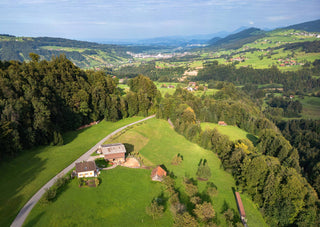

The Vista is Straight From A Retreat Holiday Brochure
It sounds like the thing everyone should have on their bucket list - a sojourn to the Swiss Alps to drink raw milk fresh from the cow while chatting to the proudest farmer you could ever meet about the bonds between his mother and baby calves and his and his family’s generational pride for their precious herd. But, all this isn’t a scene from a picture book or a romanticised advertisement, it’s real life itself as our WillPowders founder, Davinia Taylor, has cuddled them all - the cows and calves, Xaver Bachmann, the farmer, his wife, Martina and their three sons, alike!
With a carnival week as part of its yearly calendar that begins on Fat Tuesday (FFS - you couldn’t make this stuff up!), how could Davinia fail to fall in love with the Lucerne region? Famed for its picture postcard views of a traditional Switzerland and with its vast lake and its mediaeval architecture, as well as its Alpine farming culture, you don’t get more Swiss than this. In particular, the way the traditional cow herding communities live in the Lucerne region is rooted in deeply ingrained ways of living and being that have, thanks to the strict welfare policies of the Swiss government, not been spoiled by the modern industrial farming practices that are evident across the rest of Europe, and, indeed, the world. These cows get to roam free and lie down in green pastures for long periods of time, which is all natural cow behaviour, and far more comfortable than having to stand in a stall for long periods of time. And Amen to that! Switzerland, we applaud you.


Swiss Cows Are So Pampered That Their Leather is the Sought After Leather for the Luxury Car Industry
It’s actually not even possible to get any more Collagen 101 for the provenance of WillPowders Bovine Collagen Peptides than Lucerne and its Alpine farming. The cows that live here have the longest lives of farmed cattle worldwide, between 10 and 15 years depending on the farmer’s discretion about the health of individual cows compared with four and a half to six years for a dairy cow in the rest of Europe. And, once they have shuffled off this mortal coil, every part of these herds will be used in products that are both ecological and sustainable such as for beef, tallow, gelatin, organ meats, collagen and leather. Swiss cows are so pampered that their leather is the sought after leather for the luxury car industry - which kind of beats man made synthetics for sustainability any day of the week.
Know Your Herd and You Know Your Product!
Davinia is at once fiercely proud and heartwarmingly tender when talking about the Swiss cattle herd. ‘As the founder of WillPowders, I stand by the provenance of our bovine collagen peptides and that means understanding the lives and the farming methods these cattle experience. I am entirely convinced that it is not possible to farm cattle in a way that is better for the livestock or the environment,’ she told us during a visit to one of the smallholding farms in the Swiss Alpine region of Lucerne from which WillPowders bovine collagen peptides are sourced. ‘The Swiss Animal Welfare Act is among the most stringent worldwide. Under the law in Switzerland, there is a limit to the amount of livestock any one farm can have and this prevents industrial farming. Xaver and his family own 15 heads of cattle in total. Nearly half of all farm inspections are unannounced in order to ensure that the cows are consistently well cared for. The farms in the Swiss Alps are family run and the cows are regarded as part of the family. In Alpine cattle farming, each individual cow is known, respected and loved by the farmers, their family and the men and women cowherds. As a lawful requirement, each cow must be milked twice a day and each must have a name’. And, before you ask, yes, one of this season’s calves is called Davinia, after, well, our Davinia! You might guess that little heifer has bumped our Davinia off the top spot as the new poster girl in the WillPowders office! But, we couldn’t possibly comment!


What are our lovely ladies munching on?
At WillPowders, you’ll hear us talking about eating as close to nature as possible and as close to what our human genome is designed to eat. This ideal is also true of the diets of the cattle we use in our bovine collagen peptide products. Our collagen is made from grass fed cows because, as ruminants, grass is cattle’s natural diet. Well, hello Nature! When it comes to Alpine farming landscapes, Switzerland is grassland. In the summer, our Alpine herd grazes the high meadows and pastures of the Alps in the Lucerne region. The mountainous landscape means the cows are free to roam far and wide and, as a result, these ladies are as fit and agile as mountain goats! In the winter, they are brought to the lower pastures as Alpine winters are brutal on the higher mountain. As a Swiss dairy herd, our cows are fed only on grass and flora of the mountain on which they live. Even in winter, they eat grass in its preserved form of hay and aftergrass (still grass, everybody, so fret not, it’s the grass that grows back after the first cutting and is slightly richer in clover - yup, these lucky ladies literally are living in clover). Unlike cattle across the remainder of Europe, these girls are never fed silage as this can affect their milk’s ability to make raw milk products, with all their good bacteria, like cheese. So, grass and only grass it is. When we say grass-fed, we mean it!
And it’s Fresh Mountain Water to Wash it All Down
Wow - that’s a lot of grass to swallow - how are our ladies washing it all down? That one’s easy to answer - the mountain water that runs over the rocks of the mountain, which picks up natural minerals along the way. During Davinia’s visit to the farm, she was shown the irrigation system by which our cattle are kept watered. Davinia shared with us that, ‘The water the cows drink is constantly replenished as it is continuously pumped to water fonts from which the cattle can drink in addition to the natural riverlets and streams on the mountain side. This means that the ladies and their calves never encounter standing water to drink. All in all, it’s the best way you can water your herd - with some of the purest water it’s possible to find on the planet’.
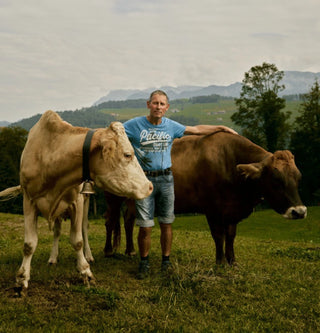

Mother and Baby Get to Snuggle Up
In Switzerland, unlike the rest of Europe, it is illegal to separate the mother cow from her calf prematurely. Each mooborn benefits from its own mother’s colostrum. That’s the nutrient rich bit of fluid which contains udderly amazing things such as antibodies to support the calf’s immune system to get it through to a healthy adulthood, and anti-inflammatory properties. The colostrum is also rich in nutrients - you might be forgiven for saying it’s yummy from mummy! It’s also key in supporting a calf’s digestive system development and, when you’ve got a stomach of four compartments, stomach development is key. So, these babies are happy in their tummies, but, of equal importance is the fact that, due to the Swiss ‘calf at foot’ policy, mum and baby spend time together so everyone feels settled and satisfied. No angst provoking lowing of abandoned babies and their bereft mothers on these dairy farms, thank goodness. Compare this to the dairy industry across Europe where cows are separated from their calves within 24 to 72 hours, purely for economic reasons, mind, and you begin to appreciate that, when it comes to animal husbandry, nothing is more satisfying than the warm, fuzzy feeling of knowing that mothers and babies get to be together, just as Momma Nature intended. However, out at pasture, because the landscape of the Alps can be unforgiving when it comes to curious little ‘uns exploring, the calves are kept close at hand by the farmer to keep them safe from injury or even death. At this point in their development, Xaver and his family hand feed the calves. But, rest assured, these older babies are happy as clams, still drinking their mother’s milk and thanking their lucky stars that they won the lottery when it comes to animal husbandry.
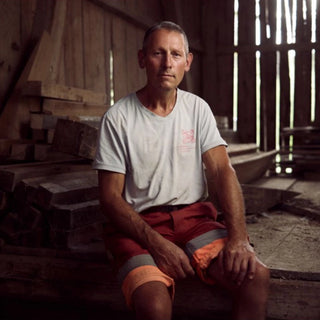

Swiss Alpine Farming Heritage is a Source of Pride
Cattle farming in the Swiss Alps remains traditional, untouched by the industrial farming that is otherwise seen across Europe. Originally, without fence lines to corral the herds, the cattle wore the traditional cow bells that are synonymous with Swiss cattle. On Xaver’s farm, the cows can have 2-3 acres each to roam, should they need a little alone time, so it’s important that they can be found and their cow bells are key for this reason. Although the farms now do have boundary lines, the cow bells remain as part of the proud heritage of cattle farming and their soothing and cheerful tones chime their notes across the mountain side, the sound as familiar and practically as old as time itself. Xaver explained to Davinia, as they watched a calf slurping milk and generally doing happy calf things, ‘Such is the importance of the herds to the communities on the mountains that the Alpabfahrt is celebrated yearly as we move our cows from their summer mountain pastures down into the lower winter pastures at the end of September. During the parade, the cows are highly decorated and we celebrate and honour them with flower crowns, flags and embroidered leather work. Our cows are part of our family and we take pride in rearing healthy, happy cattle’. That much is evident.
There is no separation or divorce between the lives of the cows and the intertwined and interdependent lives of the men and women who are cowherds and farmers. The knowledge, respect and gratitude for this is heralded across the mountain each evening in another tradition of Lucerne, with many farmers and cowherders calling the traditional Alpine blessing, the Alpsage, across the mountain to what, in ancient culture might once have been the Four Directions, but now a blessing more rooted in Catholicism, calling for the Holy Trinity and Mary to protect all living things overnight. There is no doubt that these cows are part of each farmer’s family and are revered as co-compadres, and not commodities, in life.
It’s an Extended Family Affair
Xaver and Martina and their three sons run the farm. However, the family does not end there. On this smallholding farm, with its fifteen cows, they’re not just part of the family - they are family. While this might seem a romanticised view of their business, cows who are hierarchical creatures (yup, there’s Queen Cow in any herd), will have a strict order in which they line up for milking, and these sisters can identify each individual cow which means on this farm, everyone knows everyone else. Cows in larger herds have the ability to personally identify up to 70 other cows, which just has to make you love ‘em as a species even more! Add to this that Xaver is the fifth generation to own the farm, and his mother still lends a hand with the milking and lives on the smallholding, making this a three living generations business, and the craft and depth of the herdsmanship that will be handed on to his sons is evident.
Unfortunately, to have the soil on the Alpine farms registered as organic is costly so the farmers in the area tend not to aspire to the certification. However, in Switzerland, all farms must adhere to strict regulations regarding the soil so the Alpine farmers don’t use pesticides out of respect for the neighbouring farms as any chemicals would surely drift. These farmers are interdependent and respectful within their communities and of the mountainous land and its earth that they inhabit and its legacy to future generations of humans and livestock. The flora and fauna of the pastures is what makes the milk from Swiss Alpine cows so good, so the farmers leave the grass alone.
The farming approach is humane and hands on. The whole family is invested in the health and happiness of their cattle. All in all, when we say the grass isn’t always greener, when it comes to Swiss cattle herds and their grazing, this could not be further from the truth. For them, there is no greener grass available in the world. Add to this that the sky could not be bluer and their water could not be purer, and you have the complete idyll. Of course, we aren’t going to duck the elephant in the room. These cows are raised for their milk production but, eventually, there will come a time when their health means that they have reached the end of their lives which is 10 to 15 years for this herd.
It is worth remembering the words of Khalil Gibran in his work, The Prophet, ‘Would that you could live on the fragrance of the earth, and like an air plant be sustained by the light’ but all us grown ups know that we humans don’t and can’t live this way, which means we have a responsibility to end an animal’s life at the right point for them and in the right way. The first and last human face Xaver’s cattle see is his - a face familiar to them for his friendliness, gentleness and compassion from birth through to death. He is a trained slaughterman and so, once their time comes they are still in the hands of their familiar and compassionate keeper.
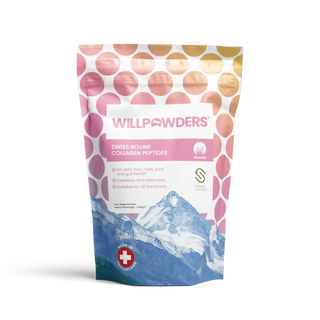

The Sad Reasons You Should Always Check the Collagen Label
At WillPowders, we know our award-winning Bovine Collagen Peptides provenance. Unfortunately, not all cows' lives are equal and not all collagen peptide companies can stake their reputations on their product provenance. Companies have been caught with their pants down regarding what should be absolutes - like the preservation of the Amazonian Rainforest and its indigenous people’s lands. In essence, Brazil’s indigenous people are considered to be the best rainforest guardians, as it is their home and the guardianship of the rainforest is likely key to preventing cataclysmic climate change. While collagen companies might claim due diligence, due to practices in Brazil, it can be difficult for them to track their product’s true provenance since, ‘Most livestock-driven deforestation can be attributed to companies’ indirect suppliers, according to Ricardo Negrini, a federal prosecutor in Brazil’s Pará state who monitors beef processors’ climate commitments. Cattle are often moved from farm to farm for different stages of rearing, so a cow born on deforested land may be fattened for slaughter at a “clean” finishing ranch. But Negrini said that, today, all meat companies have the capacity to track the cattle they buy’. [*] That’s a lot of uncomfortable animal transport for the cattle, compared with living all your life where you are born - like our Swiss cattle on an Alpine mountain in Lucerne.
And, while Brazil might seem to a long way away, if you are considering any collagen product beyond WillPowders, although, having read what glorious lives our cattle live, why would you even give it a second thought, it is worth noting that, ‘Unlike beef, soy, palm oil and other major food commodities, collagen is not covered by forthcoming due diligence legislation in the EU and UK designed to tackle deforestation. Collagen companies therefore have no obligation to track its environmental impacts’.
But, you know how we like to rip up all the wrong rules at WillPowders, so while we aren’t obliged to check our collagen’s provenance, we do anyway. When Davinia decides she’s going to hop on a plane to visit her cows for the day, that’s what Davinia does. And besides, we are well aware of the possible environmental impacts of sourcing collagen from South America, so we don’t. We fly the flag for the Alps of the Lucerne region and her beautiful cattle who graze on her mountainsides.
Mass environmental damage of factory farming across the world isn’t the only risk when it comes to the shadier provenance of some collagen. Any factory farm product heralds compromises that we can’t afford to make. This is also true of our fishy friends' health on the fish farms of the marine collagen industry who are also potentially floundering - all the puns intended - when it comes to fish health. High levels of pollution and compromised animal welfare are, unfortunately, de rigueur when it comes to industrial farming. Plus, having lived through a pandemic, how many of us would welcome the increased public health risk of zoonotic diseases, or resistance to antibiotics? When Davinia described to Xaver the feeds that some cattle are ‘fattened’ with, such as corn or soy, his response cut through the fluff that modern farming feeds us, ‘Why don’t they just feed them grass?’ he asked. Indeed. Why?
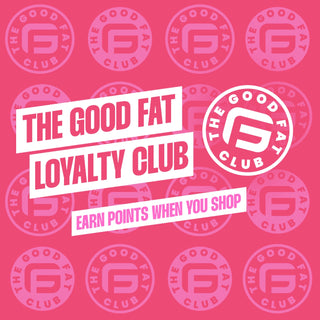

Join Our Herd of Beauties …
When it comes to collagen, WillPowders will never pile it high and sell it cheap because the quality of our collagen peptide products and the lives the cattle lead are of paramount importance to us. One cannot be separated from the other. While Davinia stays loyal to her principles of high animal welfare and the cleanest of supplements, you can show your loyalty with our Good Fat Club. Becoming a member of WillPowder’s Good Fat Loyalty Club means you’ll get rewarded whilst you shop. You know the drill - take care of the pennies, as well as taking control of your health, by earning points for fat discounts and free shipping. If you are already loyal to the WillPowders brand, that’s quite simply moo-sic to our ears! And very likely Xaver and Martina’s and their bevvy of bovine beauties, too!
Disclaimer
Our blogs are written with love in the hope that they go some way in helping you feel like the rockstar you are, and whilst we do our due diligence, research like maniacs and fact check our stuff, we know everyone’s journey is different. They are intended to educate and empower you, not usurp medical advice. We would never advise you to stop, adjust, or modify any prescription medication without the direct supervision of your healthcare practitioner, but don’t be afraid to talk to your doctor about your new found knowledge, brought to you by the marvels of nature because they don't know everything! Blogs are always informed by Davinia but often written by a member of the team. Not all blogs reflect Davinia's experiences and sometimes provide alternative perspectives

 Collagen
Collagen
 Protein
Protein
 MCT
MCT
 Electrolytes
Electrolytes
 Vitamins & Minerals
Vitamins & Minerals
 Hormones
Hormones
 Nootropics
Nootropics
 Kombucha
Kombucha
 Biohacking Books
Biohacking Books
 Bundles
Bundles
 Accessories
Accessories








